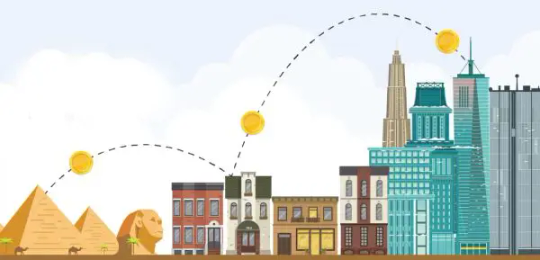#historyofforexmarket
Explore tagged Tumblr posts
Text
The Key Events that Shaped the History of Forex Trading!

Forex trading, a financial market that transcends borders and currencies, has a history deeply intertwined with the evolution of human civilization. From the barter system in ancient times to the modern global market, forex trading has undergone significant transformations, shaping the way nations, businesses, and individuals engage in international trade.

In this article, we delve into the captivating journey of forex trading, tracing its origins, pivotal milestones, and the factors that have propelled its growth into the largest and most liquid market in the world. The Barter System: The Genesis of Trade Human civilization has always thrived on the need for exchange and specialization. Before the advent of currencies, people relied on the barter system, a simple yet ingenious method of trading goods and services. Dating back to 6000 BC, this system enabled individuals to exchange commodities they possessed for ones they desired, fostering economic interactions and facilitating the fulfillment of diverse needs within communities. The Emergence of Currency: From Gold Coins to Global Trade As societies progressed, the barter system presented certain limitations, such as the need for a mutually desired item and the challenge of evaluating the relative value of different goods. To overcome these obstacles, the concept of currency emerged. During the 6th century BC, the first gold coins were minted, marking a significant shift in trade dynamics. These standardized units of value provided greater convenience, portability, and fungibility, laying the foundation for future advancements in monetary systems. The Medici Family: Pioneers of Forex Trading Fast forward to the 15th century, when the influential Medici family of Florence played a crucial role in the development of forex trading. With their extensive network of banks across different locations, the Medicis facilitated currency exchange and international trade. Their visionary approach not only enabled merchants to conduct business in foreign lands but also set the stage for the establishment of specialized financial markets dedicated to foreign exchange. The Birth of the First Forex Market in Amsterdam The 17th century marked a significant turning point in the history of forex trading. In Amsterdam, the world's first dedicated forex market came into existence, serving as a central hub for foreign exchange transactions. This pivotal development revolutionized the way currencies were traded, providing a platform for buyers and sellers to come together and establish exchange rates based on supply and demand. The Amsterdam forex market laid the groundwork for the modern forex market we know today. The Collapse of the Bretton Woods System: A Paradigm Shift The 1970s brought forth a transformative event that would shape the future of forex trading—the collapse of the Bretton Woods system. Previously, major currencies were pegged to the value of gold, fostering stability and predictability. However, as economic dynamics shifted, the fixed exchange rate system became unsustainable. The dissolution of the Bretton Woods system heralded the era of free-floating exchange rates, where currency values were determined by market forces. This fundamental change opened up new opportunities for traders to profit from fluctuations in currency values. The Technological Revolution: Empowering Individual Traders The 1980s witnessed a revolution in technology, particularly with the rise of personal computers and the internet. These advancements democratized forex trading, making it more accessible to individual traders worldwide. Previously, forex trading was predominantly the domain of large financial institutions and corporations. However, with the advent of user-friendly trading platforms, real-time data feeds, and online brokers, individuals gained the ability to participate in the forex market from the comfort of their own homes. This paradigm shift in accessibility and convenience marked a crucial milestone in the history of forex trading. Innovations in Trading Technologies: Breaking Down Barriers Continuing the trajectory set in the 1980s, the 1990s witnessed further advancements in trading technologies that revolutionized the forex market. The development of electronic communication networks (ECNs), algorithmic trading, and high-frequency trading brought unprecedented speed, efficiency, and transparency to forex transactions. These innovations not only reduced the barriers to entry for traders but also enhanced market liquidity, facilitating seamless execution of trades and enabling participants to capitalize on market opportunities with greater precision. A Global Market: Trading Around the Clock Today, the forex market transcends time zones and operates 24 hours a day, five days a week. This continuous nature of the market ensures that traders can engage in transactions at any time, regardless of their geographic location. The forex market's global reach has created a truly interconnected world of currencies, where traders can profit from fluctuations in exchange rates across different economies. The accessibility and liquidity of the forex market make it an enticing arena for investors seeking diversification, hedging, and speculative opportunities. The Future of Forex Trading: Unlimited Potential As we gaze into the future, the growth and importance of forex trading are poised to continue. With the world becoming increasingly interconnected and globalized, the opportunities for traders to profit from currency movements will expand. Technological advancements, including artificial intelligence, machine learning, and blockchain, are expected to revolutionize the forex market further. These innovations may enhance trading efficiency, provide new analytical tools, and foster increased transparency. As the forex market evolves, traders can expect a more dynamic, accessible, and rewarding trading experience. Overall, the history of forex trading is a captivating narrative that spans centuries of economic evolution and technological progress. From the barter system to the establishment of the first forex market in Amsterdam, and from the collapse of the Bretton Woods system to the digital age of algorithmic trading, each chapter in this journey has left an indelible mark on the forex landscape. Today, the forex market stands as the largest and most liquid financial market globally, inviting traders from all walks of life to explore its vast potential. If you aspire to delve deeper into the world of forex trading, a plethora of online resources and libraries offer valuable insights and knowledge to equip you on your trading journey. Read the full article
#beginner'sguidetoforextrading#forextradingforbeginners#forextradinghistory#futureofforextrading#historyofforexmarket#howforextradingstarted#howtotradeforex#keyeventsinforextradinghistory#learnforextrading#originsofforextrading#stockmarket#UK#unitedkingdom#unitedstates#USeconomy#USA
0 notes